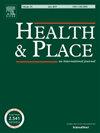“We go to the hospital everyday”: The Suncor oil refinery, environmental injustice, and contested illness
IF 4.1
2区 医学
Q1 PUBLIC, ENVIRONMENTAL & OCCUPATIONAL HEALTH
引用次数: 0
Abstract
Suncor’s refinery in Commerce City is Colorado’s only oil refinery—processing about 98,000 barrels per day—and one of its biggest greenhouse gas emitters. Since 2005, the facility has been formally cited for nearly 60 environmental violations, even operating without certain necessary permits. Nearby residents experience disproportionate health impacts, including comparatively higher rates of respiratory problems like asthma, reproductive issues and birth complications, diabetes, and cardiovascular conditions—and a 24 percent higher death rate than other Denver-area residents (Armijo and Hook, 2014; ENVIRONS, 2024). Yet, community members face contested illness. Medical practitioners, buttressed by the state, reject people’s observations linking their health problems to exposure to refinery pollutants like per- and polyfluoroalkyl substances (PFAS), benzene, and assorted volatile organic compounds. People are told that their lifestyles, genetics, diets, and pets are the real drivers of poor health outcomes. We present findings from our community-based, multidisciplinary study. We examined the health outcomes of living or working near this refinery—and how the medical establishment and the state contest environmental health claims. Utilizing data from 53 in-depth interviews, we document: (1) how people living or working around Suncor understand the refinery's impacts on their health; (2) experiences of residents in relation to responses of medical practitioners; and (3) how their observations and understanding of environmentally related illness were contested by medical and state institutions. We illustrate the environmental health and environmental justice (EJ) impacts of living near oil refineries and cultures of contested illness that seek to negate them.
“我们每天都去医院”:森科尔炼油厂、环境不公、争议性疾病
森科尔在Commerce City的炼油厂是科罗拉多州唯一的炼油厂,每天处理大约98,000桶石油,也是最大的温室气体排放者之一。自2005年以来,该设施已被正式通报近60起环境违法行为,甚至在没有获得某些必要许可的情况下运营。附近居民的健康受到了不成比例的影响,包括哮喘等呼吸系统疾病、生殖问题和分娩并发症、糖尿病和心血管疾病的发病率相对较高,死亡率比丹佛地区其他居民高24% (Armijo和Hook, 2014;环境,2024)。然而,社区成员面临着有争议的疾病。在国家的支持下,医疗从业者拒绝接受人们的观察,认为他们的健康问题与接触炼油厂污染物有关,如全氟烷基和多氟烷基物质(PFAS)、苯和各种挥发性有机化合物。人们被告知,他们的生活方式、基因、饮食和宠物是导致健康状况不佳的真正原因。我们提出了基于社区的多学科研究结果。我们调查了在这家炼油厂附近生活或工作的人的健康状况,以及医疗机构和州政府如何就环境健康声明进行争论。利用53次深度访谈的数据,我们记录了:(1)在森科尔附近生活或工作的人们如何理解炼油厂对他们健康的影响;(2)居民对医生回应的经验;(3)他们对环境相关疾病的观察和理解如何受到医疗和国家机构的质疑。我们说明了生活在炼油厂附近的环境健康和环境正义(EJ)的影响和有争议的疾病的文化,试图否定他们。
本文章由计算机程序翻译,如有差异,请以英文原文为准。
求助全文
约1分钟内获得全文
求助全文
来源期刊

Health & Place
PUBLIC, ENVIRONMENTAL & OCCUPATIONAL HEALTH-
CiteScore
7.70
自引率
6.20%
发文量
176
审稿时长
29 days
期刊介绍:
he journal is an interdisciplinary journal dedicated to the study of all aspects of health and health care in which place or location matters.
 求助内容:
求助内容: 应助结果提醒方式:
应助结果提醒方式:


